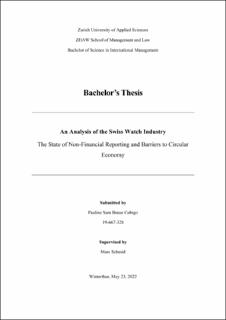Please use this identifier to cite or link to this item:
https://doi.org/10.21256/zhaw-26490Full metadata record
| DC Field | Value | Language |
|---|---|---|
| dc.contributor.advisor | Schmid, Marc | - |
| dc.contributor.author | Braun Cobigo, Pauline Sara | - |
| dc.date.accessioned | 2022-12-20T14:15:41Z | - |
| dc.date.available | 2022-12-20T14:15:41Z | - |
| dc.date.issued | 2022 | - |
| dc.identifier.uri | https://digitalcollection.zhaw.ch/handle/11475/26490 | - |
| dc.description.abstract | The watch industry plays of great relevance in Switzerland. With 59,000 people employed, the industry represents 1.5 percent of Switzerland's gross domestic product. Rising concerns have appeared regarding the environmental impact of the industry. In particular, the sourcing of raw materials, such as gold, is worrisome. The Swiss watch industry makes comparatively few efforts to decrease its environmental impacts. Therefore, it is essential to analyze the cause of the lack of activities for a more circular industry. Furthermore, an analysis of the state of non-financial reporting represents first insights into the industry's state of sustainability. The objective of the thesis was to analyze the state of non-financial reporting within the industry and identify why the Swiss watch industry does not perform as well as other industries do in regard to circularity. Therefore, barriers to the Circular Economy (CE) needed to be identified. Primary and secondary research was conducted to identify the state of non-financial reporting and barriers to the CE. Complementary, semi-structured interviews with experts employed in the watch industry were conducted. It was identified that the state of non-financial reporting in the Swiss watch industry is still in its infancy. This fact reflects the comparatively low efforts in sustainability within the industry. Furthermore, issues arose concerning the applied reporting standards as several standards exist, and the comparability among them is hardly possible. Furthermore, industry-specific barriers to a CE were identified. Lacking transparency from suppliers, particularly raw material suppliers, represents a barrier as circular inflow cannot be estimated reliably. Internal resource constraints regarding time and employee capacity and managerial constraints further decelerate the transition to a CE. Downstream barriers have further been identified to be customers' hesitation regarding more circular products. According to customers, the Swiss watch industry is associated with high-value products that do not entail recycled products. Lastly, issues concerning the opaque nature of the industry in combination with the lacking regulatory incentives and deep-rooted working habits of watchmakers impede the transition to a CE. Efforts toward more sustainability in the Swiss watchmaking industry are urgently required. Particularly the impact the industry has on the sourcing of raw materials, needs to be minimized, and barriers to a CE need to be overcome. With the approaching non-financial reporting regulations, barriers can be minimized, and the transition can be continued. Having identified barriers, the industry can actively tackle them and increase circularity along its value chain. As the qualitative research was conducted with a limited number of companies, industry-wide quantitative research should be conducted to verify the findings. This thesis represents the start of an in-depth analysis of the Swiss watch industry's transition to a CE. It is promised to represent considerable value-added for practitioners and future researchers. | de_CH |
| dc.format.extent | 92 | de_CH |
| dc.language.iso | en | de_CH |
| dc.publisher | ZHAW Zürcher Hochschule für Angewandte Wissenschaften | de_CH |
| dc.rights | https://creativecommons.org/licenses/by-nc-nd/4.0/ | de_CH |
| dc.subject.ddc | 338: Produktion | de_CH |
| dc.title | An analysis of the Swiss watch industry : the state of non-financial reporting and barriers to circular economy | de_CH |
| dc.type | Thesis: Bachelor | de_CH |
| dcterms.type | Text | de_CH |
| zhaw.departement | School of Management and Law | de_CH |
| zhaw.publisher.place | Winterthur | de_CH |
| dc.identifier.doi | 10.21256/zhaw-26490 | - |
| zhaw.originated.zhaw | Yes | de_CH |
| Appears in collections: | BSc International Management | |
Files in This Item:
| File | Description | Size | Format | |
|---|---|---|---|---|
| 2022_Braun_Cobigo_Pauline_Sara_BSc_IM.pdf | 896.78 kB | Adobe PDF |  View/Open |
Show simple item record
Braun Cobigo, P. S. (2022). An analysis of the Swiss watch industry : the state of non-financial reporting and barriers to circular economy [Bachelor’s thesis, ZHAW Zürcher Hochschule für Angewandte Wissenschaften]. https://doi.org/10.21256/zhaw-26490
Braun Cobigo, P.S. (2022) An analysis of the Swiss watch industry : the state of non-financial reporting and barriers to circular economy. Bachelor’s thesis. ZHAW Zürcher Hochschule für Angewandte Wissenschaften. Available at: https://doi.org/10.21256/zhaw-26490.
P. S. Braun Cobigo, “An analysis of the Swiss watch industry : the state of non-financial reporting and barriers to circular economy,” Bachelor’s thesis, ZHAW Zürcher Hochschule für Angewandte Wissenschaften, Winterthur, 2022. doi: 10.21256/zhaw-26490.
BRAUN COBIGO, Pauline Sara, 2022. An analysis of the Swiss watch industry : the state of non-financial reporting and barriers to circular economy. Bachelor’s thesis. Winterthur: ZHAW Zürcher Hochschule für Angewandte Wissenschaften
Braun Cobigo, Pauline Sara. 2022. “An Analysis of the Swiss Watch Industry : The State of Non-Financial Reporting and Barriers to Circular Economy.” Bachelor’s thesis, Winterthur: ZHAW Zürcher Hochschule für Angewandte Wissenschaften. https://doi.org/10.21256/zhaw-26490.
Braun Cobigo, Pauline Sara. An Analysis of the Swiss Watch Industry : The State of Non-Financial Reporting and Barriers to Circular Economy. ZHAW Zürcher Hochschule für Angewandte Wissenschaften, 2022, https://doi.org/10.21256/zhaw-26490.
Items in DSpace are protected by copyright, with all rights reserved, unless otherwise indicated.